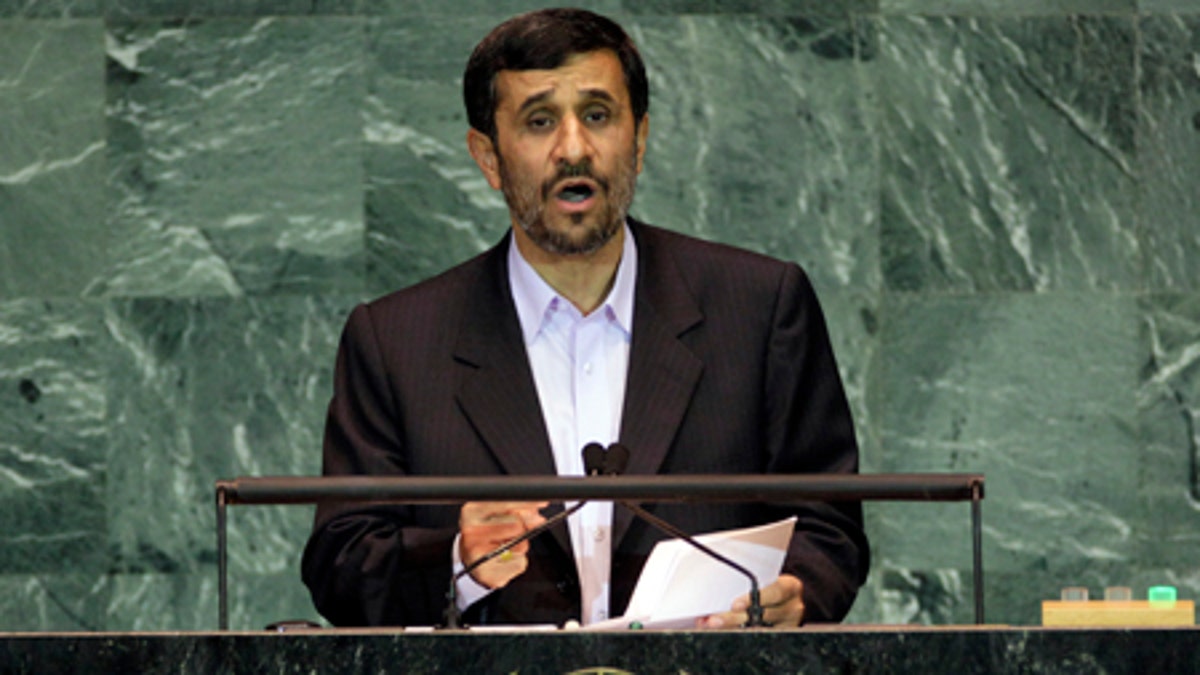
Sept. 23: Iran's President Mahmoud Ahmadinejad addresses the 64th session of the United Nations General Assembly at U.N. headquarters (AP)
Iran’s Mahmoud Ahmadinejad used his address Wednesday evening to the United Nations’ General Assembly to criticize capitalism and what he described as the hypocrisy of Western powers — while also leaving an opening for conciliation on the issue of nuclear weapons.
Capitalism’s “unfair system of thought has reached the end of the road and is unable to move,” Ahmadinejad, Iran’s president, said in his highly anticipated speech in New York.
The Iranian leader issue stinging attacks on the United States and its allies without calling them by name, and delegations from several nations, including the U.S., walked out during the speech, partly in protest of Ahmadinejad’s past statements blasting Israel and denying the holocaust.
But he also has faced pressure from the West to come clean about Iran’s nuclear program. Moments before he spoke, foreign ministers of six global powers told reporters on the sidelines of the General Assembly that they are optimistic, and tougher sanctions against Iran are being considered if talks between the powers and Iran on the issue, set for Oct. 1, don't yield results.
Russia Suggests It's Open to New Sanctions
Ahmadinejad didn't address Iran's nuclear program directly in his speech, but he assailed what he called “despicable forms of intimidation and deceit in the name of freedom.”
“It is no longer possible to humiliate nations and impose double standards on the world community,” Ahmadinejad said, according to the English interpreter.
And he assailed Israel for what he said was a "barbaric" attack on the Gaza Strip last winter.
The adversarial stance was nothing new from Ahmadinejad, and Western diplomats immediately dismissed it as more of the same.
“It is disappointing that Mr. Ahmadinejad has once again chosen to espouse hateful, offensive and anti-Semitic rhetoric," said Mark Kornblau, spokesman for the U.S. Mission to the United Nations.
Behind Every Despot, a Despot Housewife
Yet Ahmadinejad also said his country is ready to shake all hands "that are honestly extended to us," and he announced Iran's commitment to participate in building durable peace and security worldwide for all nations while defending the country's legitimate and legal rights.
In earlier speeches to the General Assembly, U.S. President Obama, French President Nicolas Sarkozy and others had taken Iran to task for its nuclear ambitions.
The U.S. and its allies believe Iran is trying to make nuclear weapons, despite Tehran's assertion that it is only building a peaceful nuclear energy program.
The International Atomic Energy Agency says Iran has not been forthcoming about its nuclear program, and the U.N. Security Council has imposed sanctions against Iran three times since 2006 for its refusal to freeze uranium enrichment.
The Assoiciated Press contributed to this report.
